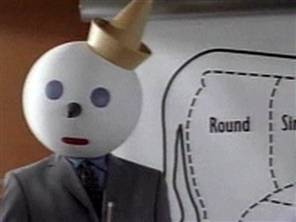
It is a rule universally acknowledged that when knocking out traditional newspaper obituaries, or even those obit hybrids called “appreciations,” the dutiful scribe should do everything possible to avoid speaking ill of the dead. (“No one brought more pride to a disheartened nation in so short a time as did Mr. Hitler.”)
So, Out There is happy to note that its writer is under no such fusty obligation when drawing attention to the passing of Carl Nicholas Karcher, 90, founder and chairman emeritus of the Carl’s Jr. restaurant chain. Mr. Karcher died Jan. 11 in Fullerton, Calif., and although he has been referred to as a “giant” of the fast-food industry, his particular accomplishments made life worse, not better, for those who eat out and those who come out.
Strange that two of the most gay-negative American figures of the 1970s would be connected to food: Karcher and Anita Bryant, the orange-juice flack whose robotically vicious “Save Our Children” campaign against gay rights empowered both gay-haters and their opposites.
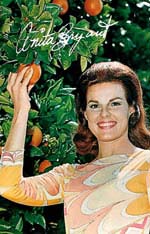
The initial, misery-making success of Bryant’s efforts personally backfired, causing the saccharine singer to lose not only her big-bucks position with the Florida Citrus Commission — a national o-jay boycott had its consequences — but also her husband at the time, her manifold businesses, and her Little Miss Sunshine fame. She became despised, a national figure of fun.
Bryant succeeded, however, in normalizing the “no special rights” and “they recruit our children” arguments that continue to belch up in those sad and sobering online-comment threads. You still can’t adopt children in Florida, and many other states, if you’re queer.
I have read that the miscreant later apologized for her potentially self-serving bigotry, but any record of that crow meal remains, shall we say, fugitive: the “apology” heard ’round the block.
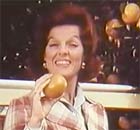
No one has published Ms. Bryant’s obit yet, though I bet a few, careful 800-word pieces are sitting in the computer files of well-run traditional papers and wires, ready and waiting.
Sins of the Fresh
Mr. Karcher committed two mortal sins, and Out There leaves it to faithful readers to measure their relative badness. The first? According to Nation’s Restaurant News, a remarkably on-the-ball trade rag, Karcher invented — or at least first instituted, in a balance-sheet manner — char-broiled chicken-breast sandwiches, self-service beverage stations, and, maxima culpa, the salad bar.
During the time giant reptiles and scaly raptors ruled the Earth, I wrote a column about why salad bars would be the death of salads. I am sure that present readers, whose Favorites Lists are pregnant with culinary blogs of every kind, will be able to recite as their birthright my now wearisome points. I must admit that at my last job, deep in Manhattan’s midtown, I occasionally opted for the salad bar’s scion, the “point and shake” plastic-bowl assemblies of greens, proteins, and salty bits, knit by a flavored mucilage called dressing.
Salad bar pluses? Ingredients a 7-year-old may never have seen. A lesson in do-it-yourself. A microcosm of community, a five-minute food co-op without dues or obligation.
Negatives? Gee whiz…how about “germ farm.” A substitution of promise for satisfaction, of choice for achievement. The permanent exile of seasonal pleasure.
Bad Mr. Karcher! (Rich Mr. Karcher.)
Briggs Goes Down
His plentiful lettuce, dear readers, funded something called the Briggs Initiative, or Proposition 6, on the California ballot in 1978. John V. Briggs was a queer-hating state assemblyman and senator from Orange County who wanted to keep gay men and lesbians from teaching in public schools because they were, every single one, “immoral.” He got his half-million signatures, and Carl Sr. threw his hamburger buns completely behind the strident effort.
According to the Advocate, Joan Baez, Harry Chapin, Holly Near, and Peter Yarrow raised $25,000 (not so bad then) at a sold-out benefit concert in Santa Monica to fight the proposal — already law in Arkansas and Oklahoma (which is where Anita Bryant withdrew). And then, former California governor Ronald Reagan, ready to run for president, quietly let it be known he was against the proposition, saying that as far as he knew, homosexuality wasn’t infectious “like the measles.” Briggs went down.
In 1989 (according to Bloomberg News), Carl Karcher agreed to pay a $664,000 fine to the Securities and Exchange Commission to settle charges of insider trading, with no admission of guilt attached.
A Horatio Alger Story
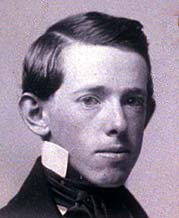
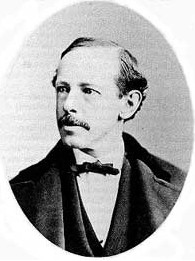
Left, Horatio Alger, Jr. at Harvard in 1853; right, the wildly successful author of Ragged Dick
You want something nice? In 1979, the businessman received the Horatio Alger Award, a solid recognition of Karcher’s bootstrapiness. It is very likely that no one at the teary ceremony mentioned the easily demonstrated queer, and criminal, subtext of Horatio Alger, Jr.’s novels, or, if you scour the records, that the real-life author was attracted to an assortment of Carl Jrs.: the frisky Cape Cod reverend was a pederast, a lover of boys. Of course, after Alger escaped to New York and became wealthy, he tried his best to make things better for male orphans and runaways.
Belated congratulations, and farewell, Mr. Karcher.
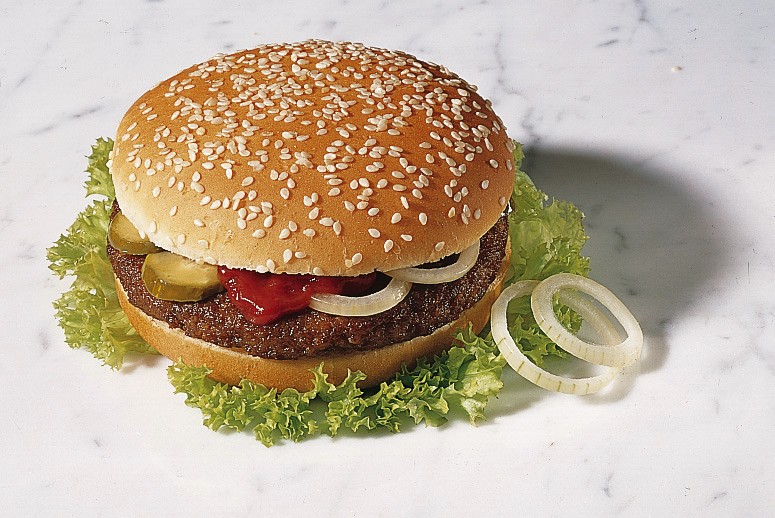
* * *
In answer to the last post’s question, its poetic title “Handful of Clouds” comes initially not from dialog in Jimmy Cagney’s first film (as I had thought), but, according to S.F. Weekly’s irresistible restaurant critic and cineaste Meredith Brody, from a 1930 film “based on the Rowland Brown short story ‘A Handful of Clouds’ that I think introduced the concept or metaphor to Hollywood (it’s called The Doorway to Hell but A Handful of Clouds in England).” The Gay Recluse got it as well (see comment on previous post).
I grabbed the phrase from the also-1930 Sinner’s Holiday, in which the clattering Cagney character uses it as softener for death: “You don’t think I’m the guy who handed Mitch that handful of clouds, do ya?” (He shot Mitch.)
Who Do You Trust? was a 1960s afternoon-TV quiz show starring Johnny Carson, whose title gave high-school English teachers prissy ammunition and whose popularity shot the once-hayseed host onto nighttime NBC.
* * *
For an automatic alert when there is a new Out There post, email jiweinste@aol.com.
Jeff Weinstein's Cultural Mixology

It’s nice to be reminded that even the most vile among us — like Huckabee and Company, to name an obvious example — will one day soon pass into irrelevance and then oblivion (the two certainties they fear the most).
Jeff,
The defeat of Proposition 6, which I worked for, took a lot more than then Governor Reagan’s barely reported remark, which I don’t recall hearing at the time. Pacy Markman — creative advertising executive, political consultant and comedy writer (!) — was hired to orchestrate the “No on 6” campaign. He framed the issue (that was before there were “frames” — it was “positioned it”) as an anti-privacy proposition so deftly that even John Wayne switched teams (propositionally, that is) and came out against Prop 6.
The “No on 6” victory dinner at the Beverly Hilton Hotel was a particularly emotional event in 1978: among the speakers I recall were Burt Lancaster, Congressman Henry Waxman and Midge Costanza, who had recently been fired by President Carter as the White House’s advisor on women’s issues. Costanza claimed that she didn’t have a problem with Carter being born-again, she just couldn’t understand why he decided to come back as himself.
Thank you yet again for the reality check and the memory jog…Bill Stern
——————————————————————————–
I am in my late sixties. I remember Anita Bryant appearing on television and making her public apology. She was divorcing her husband and said that he was the devil that made her do it, as he was a very conservative Christian and influenced her negatively. She appeared holding hands with a “gay friend” and I think another person who may have been a church buddy. She didn’t just say, Gee whiz I’m sorry. She said she had been terribly wrong and that God loves everybody, etc. The press didn’t dwell on it. She got her moment in the spotlight for her apology and has apparently spent the rest of her life trying to stay in the background. My impression now is that her first husband was, indeed, a notorious right-wing, self-styled Christian bigot, and he was older than she. I remember that at the time, I found her convincing. Her insistence later that she follows a live-and-let-live policy suggests to me that she doesn’t want to offend anybody–gay or straight. It looks to me that she’s more concerned about being able to make a living than making any political posturing in either direction. It’s possible that she’s a gay-affirming Christian, but that she’s afraid to be open because her biggest fans are right-wing, conservative gay bashers. Then again, maybe her only purpose in apologizing was in hopes of getting her orange juice job back. Only Anita knows for sure.